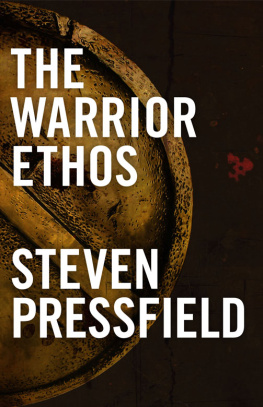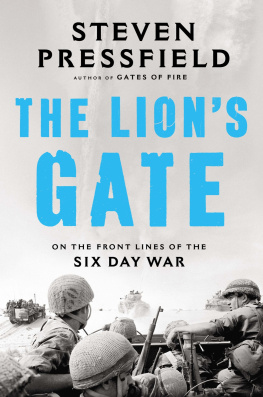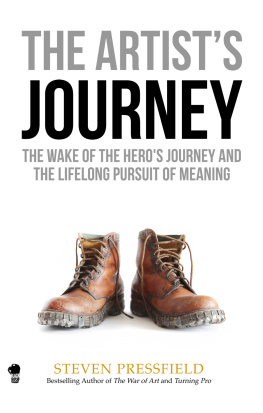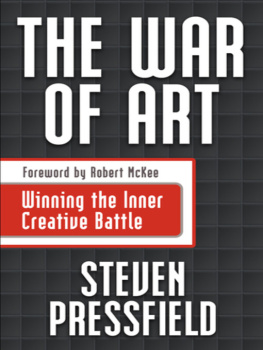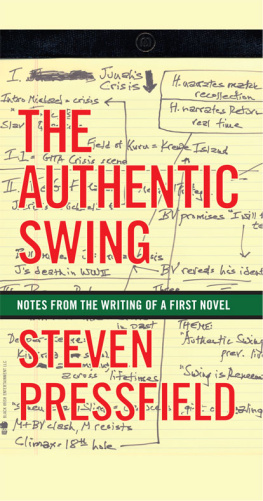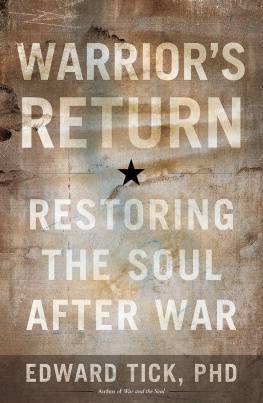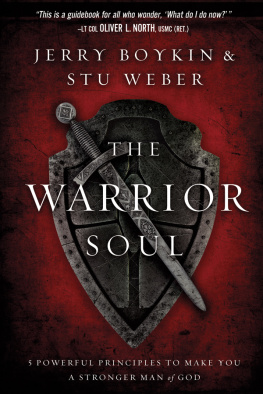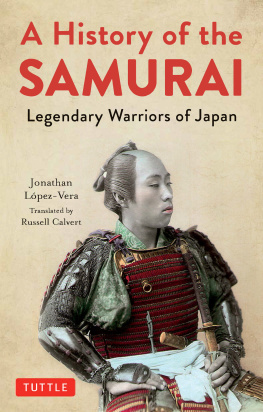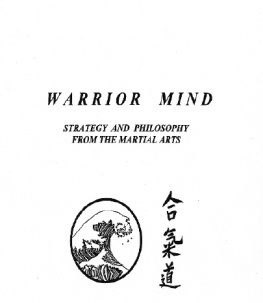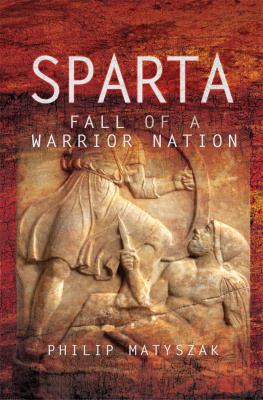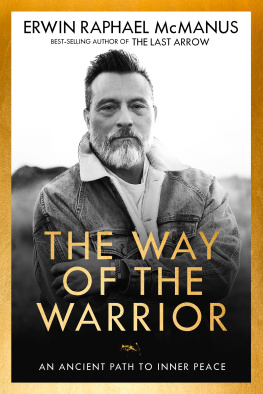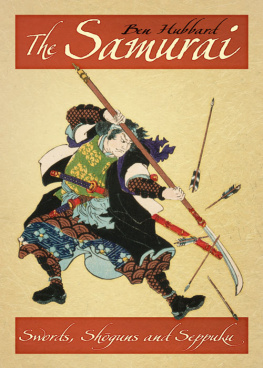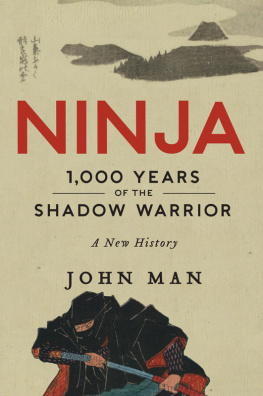THE
WARRIOR
ETHOS
STEVEN PRESSFIELD

ALSO BY STEVEN PRESSFIELD
FICTION
The Profession
Killing Rommel
The Afghan Campaign
The Virtues of War
Last of the Amazons
Tides of War
Gates of Fire
The Legend of Bagger Vance
NONFICTION
Do the Work
The War of Art

The Spartans do not ask
how many are the enemy
but where are they.
Plutarch
Sayings of the Spartans
WRITING ABOUT WAR
I am a writer. I write about warexternal wars and internal wars, wars ancient and modern, real wars out of history and imagined wars that exist only in speculation. Why? I dont even know myself.
My newest book is called The Profession . Its set a generation into the future. The Profession posits a world in which combatants, serving for hire, have been cut loose from the traditional rules of war and are no longer bound by the standards of honor that have governed Western armies since Troy and before. This was new territory for me. Questions of right and wrong arose that I had never considered. The subject forced me to do some hard thinking.
Does a fighting man require a flag or a cause to claim a code of honor? Or does a warrior ethos arise spontaneously, called forth by necessity and the needs of the human heart? Is honor coded into our genes? What does honor consist ofin an age when the concept seems almost abandoned by society at large, at least in the West?
What is the Warrior Ethos? Where did it come from? What form does it take today?
This volume is my attempt to address these questions. The book makes no claim to provide an ultimate, definitive answer. Its just one mans thoughts and observations on the subject.
The Warrior Ethos was written for our men and women in uniform, but its utility, I hope, will not be limited to the sphere of literal armed conflict. We all fight warsin our work, within our families and abroad in the wider world. Each of us struggles every day to define and defend our sense of purpose and integrity, to justify our existence on the planet and to understand, if only within our own hearts, who we are and what we believe in.
We are all warriors. Do we fight by a code? If so, what is it? What is the Warrior Ethos? How do we (and how can we) use it and be true to it in our internal and external lives?
PART ONE
ACADEMIES OF WAR
TOUGH MOTHERS
T hree stories from ancient Sparta:
A messenger returned to Sparta from a battle. The women clustered around. To one, the messenger said, Mother, I bring sad news: your son was killed facing the enemy. The mother said, He is my son. Your other son is alive and unhurt, said the messenger. He fled from the enemy. The mother said, He is not my son. A different messenger returned from a battle and was hailed by a Spartan mother: How fares our country, herald? The messenger burst into tears. Mother, I pity you, he said. All five of your sons have been killed facing the enemy. You fool! said the woman. I did not ask of my sons. I asked whether Sparta was victorious! Indeed, Mother, our warriors have prevailed. Then I am happy, said the mother, and she turned and walked home. Two warriors, brothers, were fleeing from the enemy back toward the city. Their mother happened to be on the road and saw them running toward her. She lifted her skirts above her waist. Where do you two think youre running? Back here from whence you came?
The most famous Spartan mother story is also the shortest:
A Spartan mother handed her son his shield as he prepared to march off to battle. She said, Come back with this or on it.
Thats a warrior culture. Thats the Warrior Ethos.
A Spartan colonel, a man in his fifties, was accused of accepting bribes in an overseas command. When his mother back home learned of this, she wrote him the following letter: Either quit your thieving or quit breathing.
The Warrior Ethos embodies certain virtuescourage, honor, loyalty, integrity, selflessness and othersthat most warrior societies believe must be inculcated from birth. In Sparta, every newborn boy was brought before the magistrates to be examined for physical hardiness. If a child was judged unfit, he was taken to a wild gorge on Mount Taygetos, the mountain overlooking the city, and left for the wolves.
We have no reports of a mother weeping or protesting.
WOMEN FIRST
O ne scene in my book Gates of Fire has elicited more passionate feedback than any other. Its the one where the Spartan king Leonidas explains what criteria he employed to select the specific 300 warriors that he chose to march off with him and die defending the pass at Thermopylae. The scene is fiction. Theres no evidence that anything like it happened in real life. But something about the moment seems to ring so true that it has produced a torrent of letters and e-mails.
Leonidas picked the men he did, he explains, not for their warrior prowess as individuals or collectively. He could as easily have selected 300 others, or twenty groups of 300 others, and they all would have fought bravely and to the death. That was what Spartans were raised to do. Such an act was the apex, to them, of warrior honor.
But the king didnt pick his 300 champions for that quality. He picked them instead, he says, for the courage of their women. He chose these specific warriors for the strength of their wives and mothers to bear up under their loss.
Leonidas knew that to defend Thermopylae was certain death. No force could stand against the overwhelming numbers of the Persian invaders. Leonidas also knew that ultimate victory would be brought about (if indeed it could be brought about) in subsequent battles, fought not by this initial band of defenders but by the united armies of the Greek city-states in the coming months and years.
What would inspire these latter warriors? What would steel their will to resistand prevent them from offering the tokens of surrender that the Persian king Xerxes demanded of them?
Leonidas knew that the 300 Spartans would die. The bigger question was, How would Sparta herself react to their deaths? If Sparta fell apart, all of Greece would collapse with her. But who would the Spartans themselves look to in the decisive hour? They would look to the womento the wives and mothers of the fallen.
If these women gave way, if they fell to weeping and despair, then all the women of Sparta would give way too. Sparta herself would buckle and, with her, all of Greece.
But the Spartan women didnt break, and they didnt give way. The year after Thermopylae, the Greek fleet and army threw back the Persian multitudes at Salamis and Plataea. The West survived then, in no small measure because of her women.
The lioness hunts. The alpha female defends the wolf pack. The Warrior Ethos is not, at bottom, a manifestation only of male aggression or of the masculine will to dominance. Its foundation is society-wide. It rests on the will and resolve of mothers and wives and daughtersand, in no few instances, of female warriors as wellto defend their children, their home soil and the values of their culture.
EAST OF EDEN
W here did the Warrior Ethos come from? Why would anyone choose this hard, dangerous life? What could be the philosophy behind such a choice?
An answer may come from the Garden of Eden (which is an archetypal myth common to many cultures other than our own Judeo-Christian).
God sets up Adam and Eve in paradise, where all their needs are met without effort. But He warns them, Dont go near that tree in the center of the garden. Of course, they do. The mother and father of the human race choose to eat the fruit of the tree of knowledge of good and evil.
Next page
